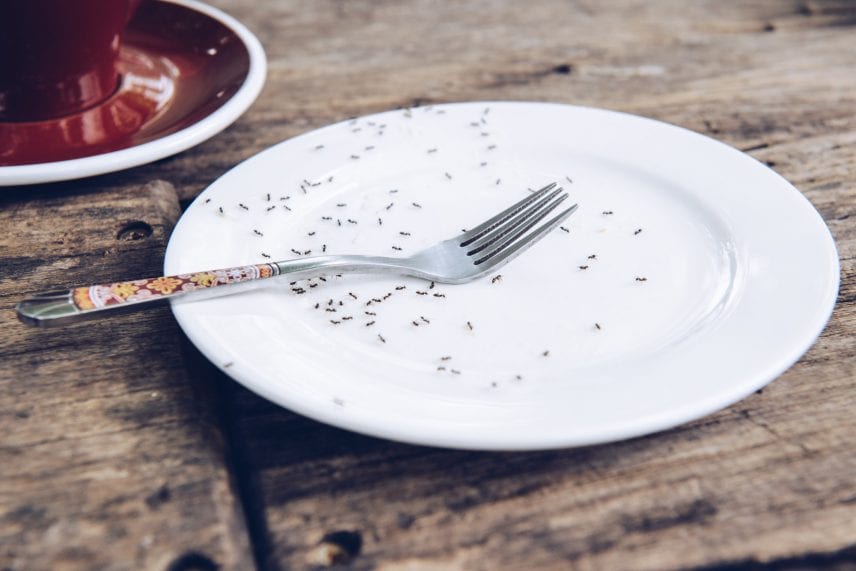Ants can do a lot more than ruin a picnic; they can destroy huge amounts of people’s property. Carpenter ants, the worst of the lot, cause serious damage to wooden structures and property each year. Letting an ant problem spiral out of control in your home could add you to their list of victims.
That’s why it’s vital to tackle ant infestations as soon as possible before they can wreak too much havoc. Not only do you need to act fast, but you also need to act smart. Here are seven common DIY strategies and why they often don’t work.
1. Quick-Killing Bait
Using a poisoned bait to kill off your ants is a smart trick. You can use greasy, sweet, or protein-based baits to lure them in. Once they start snacking, they’ll also ingest the poison and start dying off.
However, if you notice that you see piles of dead ants, but you’ve still got an ongoing problem, there might be a fatal flaw in your plan. Bizarrely, if you kill off ants too quickly, you won’t be solving your issue.
If you kill off the forager ants too quickly, they will die on the spot. What you need to do is let them live long enough to bring the food back to their nest and kill off the eggs and queen ants too. Otherwise, more forager ants will be bred, and the colony will live on.
2. Bait Aversion
Similarly, there could be another issue with your plan of poisoned bait. There are many different types of ants, and they all react differently to different types of bait. To really rid yourself of an ant infestation, you need to make sure you’re using the right one.
You need the bait to be made of a substance that attracts the type of ants you have. That’s why you should always start off your plan of attack by identifying the type of ant infestation you’re dealing with.
For example, odorous house ants prefer sweet food, so laying down a sweet bait is the best way to lure them in. You’ll know pretty quickly if you’re using the wrong bait, as your bait will be left untouched by the marauding ants.
3. Huge Ant Infestations
If you’ve had an ant infestation in the house for a while, it might be that it’s just gotten too big for a DIY plan to handle. Ants are attracted to food, so once a colony sets in, more and more will come to join in.
You can try to up the amount of ant bait or other techniques you’re using, but it could be that the situation is simply too big to handle. This might be a sign you need to call in a professional.
4. The Boiling Water Mistake
A lot of people’s first thoughts about how to get rid of an ant infestation is to simply use boiling water. Of course, pouring boiling water on an ant mound will drown and burn the ants to death, but it rarely gets them all.
The boiling water technique often only kills 60% of the colony. The other 40% is then free to wander off and start another colony somewhere else on your property. Instead of ending the problem, you’ve merely relocated it.
5. No Queen Ant
Something many people don’t know about how to stop an ant infestation is that you need to kill the queen ant. Much like bees, forager ants all work to support and breed with the queen ant. If you don’t kill her, then the colony will endure and re-grow from her eggs.
That’s why it’s vital to identify the problem accurately. Find the colony nest itself and attack the root of the problem instead of going after the more visible forager ants. Otherwise, you’re playing a losing battle against the tiny critters.
6. Improperly Mixed Solutions
There are a lot of DIY solutions that involve mixing vinegar, oils, or other household products together. These mixtures will often end up forming a chemical or solution that will kill off the ants altogether.
However, because there are so many DIY recipes online, it’s hard to know which ones to trust. Not every recipe is reliable, so you might end up wasting your household supplies on a sub-par mixture that will only wash the colony away, rather than killing off the ants inside.
7. Wrong Dish Soap
If you find a sudden ant infestation, dish soap is likely to be one of the closest things you have on hand. It’s true that dish soap, when sprayed on ants, will kill them off, using the chemicals to break down the exoskeletons.
However, if you use eco-friendly dish soap, it might not contain enough of the dangerous chemicals to kill the ants. What’s more, spraying dish soap really only works on the ones you can see. Once again, it’s not enough to attack the nest and the root cause of the problem itself.
Ready to Be Rid of Your Problem?
Ant infestations are harder to get rid of than many people might think. That’s why it’s best to go straight to the professional. Your DIY tactics might be failing for any number of reasons.
Going to a specialist professional, like Pointe Pest Control, for your residential ant control services gives you full peace of mind. We have years of experience handling these kinds of jobs and know how to handle the problem quickly and efficiently.
Letting a problem drag on for too long only gives the ants more time to destroy your property. Save yourself time and money in the long run and contact our team at Pointe Pest Control to get rid of your infestation.


